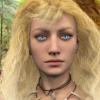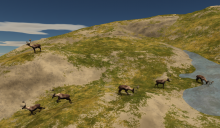Replicator help needed
 SileneUK
Posts: 1,975
SileneUK
Posts: 1,975
I have a big scene, but extracted out a hill and the masters of the reindeer I need to place on the hill. Maybe the hill is the problem, maybe replicating each of the posed reindeer needs special settings as they are on a hill. I don't know. Unless I use the replicator for something like a tree trunk or bush, I cannot get things to sit properly except on a flat plane. I can manage to replicate things like fences that go in the straight line on the flat. Or trees, eg, are all going to be the same vertically as they grow up. Animals walking or standing on a hill need to have their bodies tilted, etc. It's driving me nuts to the point where I think I am not gaining anything by replicating.
There are six of AM's reindeer/caribou. I converted them to objects after posing to reduce file size by half... and thinking fixed vs rigged objects is what is needed to replicate. 5mb vs 12 mb for rigged.
Here they are on the 'hill'. I don't need a large herd, just maybe 5 of each that I can spread around doing their action. Grazing, running, jumping, drinking, being alert and walking.
PhilW.... I got out your replicate tut in your series, but am missing something to get the objects place properly on a hill.
Help?  Silene
Silene





Comments
are you using surface replication?
there s a separate replication thats a grid.
there a randomize settings to be set so they rotate in the directions you want
tee hee, would be fun to use a particle emitter to launch flying reindeer
align to normals
These are free range reindeer!! Not being trained to pull Santa's sleigh. Actually, they will end up as some prehistoric family's dinner as they will be hunted.
It's the xyz thing that messes my head up... I don't know how to place the replicated objects to the correct part of the plane and in correct distance from each other. It's not a flat plane on an incline, it is a lumpy hill. It's not like trees which can sink a bit below the plane. I tried the collision detector button at the top, but it does not seem to work for me even on real objects. If you raise the object up on the z axis, then back down, it still goes right through the plane for me.
Do replicated objects really save that much memory/file size?
My mind is tired... I have my eye surgery next Monday and really wanted to finish this scene for the intended people before then. I won't have vision for almost a week aftewards.
Brainstorming
Maybe group a very small terrain with each reindeer so that it is standing properly on its own tiny island. Use the zero edge filter so that the smaller terrain is like a stand.. Make sure the tiny island terrain shader matches the larger terrain. Then replicate the group on the terrain. That way the smaller terrain-stand can sink a little without hiding the reindeer hooves.
That is bloody BRILLIANT! And I can do that because the little hill you see is just a part of a big valley... so it won't be noticeable.
Thank you, thank you, thank you!
ETA: When I have time I need to get up to speed with replicator, though, it is really useful!
The larger your replicated item is, the bigger the positioning "error" will be. Also the steeper the terrain, the bigger the positioning "error" will be. This is because the replicant (? going all Blade Runner here!) / instance is positioned and oriented at the origin point of the master object. You can move the origin point by pressing Caps Lock before dragging the translate arrows. Of course, this may not produce the result you want.
You can orient the replican...er thing perpendicular to the surface normal by checking "Align to Normals" (as Misty mentioned). It works great for small things like grass etc, but generally not so well for things like trees. Reindeer... probably fine if they're facing up/down slope, but tilted over sideways will look unnatural. Unfortunately Carrara doesn't give us much in terms of fine tuning replicator output. (Daz really should buy Howie's Ultrascatter code and backfit it into Carrara!)
That leaves Diomede's idea of a microterrain that acts as a base for the reindeer This should be tall enough that the bottom edge doesn't show even on the steepest slope, and enables the reindeer to stay more or less upright (a bit of random variation in x-y orientation is always useful).It should also be small and flat enough that it doesn't look too obvious. It's something I've done with trees (you don't want to see the flat base of a tree sticking out of the hillside!), and gets good results. A bit of 3d grass around the reindeer's feet will help blend things in.
Don't forget you can stack replicators in Carrara - using the output of one replicator as input to another. But you will start to notice a bit of a performance hit when moving stuff around and the replicators keep updating.
Thanks for the advice. I was wondering if it made a difference in file size if I populated the reindeer in the modelling room? EG, to create a set of reindeer in various positions that appear as one instance of an object in the scene. That way I can tweak their positions on the required slope in the modelling room. So I'd have a set for the lower slopes, a set for the higher pitch slope, and a set for the flat area in the riverbed. Maybe have 5 reindeer in each set? Does that change the resources used? I thought an obj was an obj and it has one shader map for each object. Is there is difference from doing that vs just placing individual reindeer around where I want them?
I don't need a big herd... and don't want to make more work for my poor brain. My hard drive has advised me that it has an error with a big red circle X and warned me to backup. Ugh. I just shut all resource hungry things down and am now just on the net, but will switch over to my chromebook and take this beast back to the shop. I hope they can back up all and transfer when they replace the drive. Don't want to have to reinstall everything. Ugh.
Cheers again for the help!
Yes, it makes a potentially huge difference. BUT . . .
In Carrara, a duplicate (Cmd-D / Ctrl-D) is essentially the same as a replication. It's just a pointer to the master object inside a minimal wrapper that contains position, attitude, and scale information. You can tell this because if you click on the spanner icon to edit it, you will be asked if you want to edit the master or generate a second copy. So duplicating a bunch of objects can be better than using a replicator, cos you can reposition/scale/rotate each duplicate. And the bigger/more complex the object, the bigger the saving.
BUT . . . (there's always a but!) some objects can't be duplicated in this way, particularly if they are rigged - it just won't do it. So then your only choice is to load a fresh copy of the object each time (could be very expensive in memory/disk space/load & save times) or use a replicator.
BTW Don't ignore that hard drive warning, Get everything off it that you want to save, and do it now. That drive WILL fail sooner rather than later, and you'll lose anything that you don't have backed up.
Hi Tim, It's now in the shop and they are copying all things DAZ and Zbrush as I can reload all the other things again, but don't want to do that with DAZ stuff...yikes.
OK I understand better now about duplicate. I knew about rigged items, so I exported them via GoZ after posing each of the five reindeer, and then back in as objects. GoZ made it very easy. So each reindeer object was much smaller than the rigged one. And if duplicate reduces that further, good news!
I won't have my machine back till after my eye surgery Monday, so will be doing nothing for all of next week. I am so disappointed as I was in the middle of my project for an archaeological group's website, etc. I was volunteering my artwork, but still... I sent them what I had done so far with an explanation, but I feel like I have really let them down. I hope I can continue with this and that they will still want it after all the aggro. Have spent a lot of time with it already.